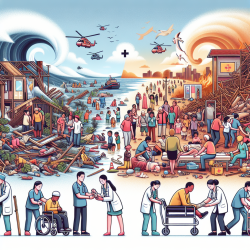Introduction
In the dynamic world of humanitarian crises, effective coordination between organizations, agencies, and bodies providing or financing health services is crucial. A recent systematic review, titled Effectiveness of Mechanisms and Models of Coordination between Organizations, Agencies and Bodies Providing or Financing Health Services in Humanitarian Crises, sheds light on how different coordination models can improve health outcomes. This blog post will explore the key findings of this research and how practitioners can enhance their skills by implementing these insights.
Key Findings from the Research
The review highlights two primary types of coordination: information coordination and management/directive coordination. Both have shown potential in improving health system inputs and access to health services in crisis settings.
- Information Coordination: The use of information and communication technologies can enhance disaster response performance by increasing the number of support functions and transactions for health and medical care.
- Management/Directive Coordination: Models like the cluster approach improve coordination among organizations, reduce duplication, and enhance the quality of services through a common approach for training providers.
Implications for Practitioners
Practitioners can leverage these findings to improve their coordination efforts in humanitarian crises. Here are some actionable steps:
- Embrace Technology: Utilize information and communication technologies to streamline coordination and enhance the efficiency of health service delivery.
- Adopt Cluster Models: Implement management/directive coordination models like the cluster approach to improve service delivery and reduce resource wastage.
- Engage in Continuous Learning: Stay informed about the latest research and developments in coordination models to enhance your skills and effectiveness in crisis settings.
Encouragement for Further Research
While the findings are promising, the evidence is of very low quality, highlighting the need for further research. Practitioners are encouraged to engage in research efforts to explore the effectiveness of different coordination mechanisms. This will not only improve their own practice but also contribute to the broader field of humanitarian crisis management.
Conclusion
Effective coordination in humanitarian crises is essential for improving health outcomes and service delivery. By implementing the insights from this systematic review, practitioners can enhance their skills and contribute to more efficient and equitable health service delivery in crisis settings.
To read the original research paper, please follow this link: Effectiveness of Mechanisms and Models of Coordination between Organizations, Agencies and Bodies Providing or Financing Health Services in Humanitarian Crises: A Systematic Review.










